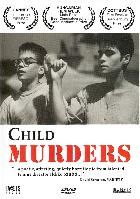Films et séries
Lien vers Amazon
Mon contenu
Meurtres d’enfants (Gyerekgyilkosságok)
Titre anglais : Child Murders
Titre allemand : Kindermorde
Titre grec : Φόνοι παιδιών
Titre russe : Детские убийства
Titre original : Gyerekgyilkosságok
Titre allemand : Kindermorde
Titre grec : Φόνοι παιδιών
Titre russe : Детские убийства
Titre original : Gyerekgyilkosságok
Titres alternatifs :
Fonoi paidion / Детоубийцы
Fonoi paidion / Детоубийцы
Drame de jeunesse – La Hongrie, Allemagne
Année de production : 1992
Durée du film : 78 minutes
Année de production : 1992
Durée du film : 78 minutes
Réalisateur : Ildikó Szabó
Livre : Ildikó Szabó
Caméra : Tamás Sas
Musique : János Másik
Livre : Ildikó Szabó
Caméra : Tamás Sas
Musique : János Másik

Description du film :
Zsolt lives with his bedridden, alcoholic grandmother who demands his constant attention. He finds friendship with a pregnant gypsy girl and helps her when she has a miscarriage, but at the cost of being ostracized and beaten by other children.
Twelve years old, Zsolt has lived in a tiny Budapest apartment with his elderly grandmother since his mother abandoned him. However, it is more the case that he takes care of her, getting her up in the morning, sing-ing with her, bathing her. She is an alcoholic, and her grandson is an object of derision among his schoolmates. Ibi, who lives in the same apartment building, is cold in the extreme, taunting and bullying Zsolt daily; it is she who has given him the nickname Sodabottle because he wears glasses. How can a child be this way? Ibi has a mother who insists she always wear white dresses – mostly as a way of asserting her power over her daughter because, it is implied, she also is miserably unhappy with her lot in life. Thus Ibi »acts out« on Zsolt for the unhappiness that’s being inflicted upon her at home.
Zsolt befriends a homeless, pregnant Gypsy girl. When Juli suffers a miscarriage and they dispose of the corpse in the Danube, Ibi tattles to the police, who incarcerate Juli as a baby killer; in prison Juli commits suicide. In a stunning shot Ibi herself goes into the Danube and drowns, the result of strength that the spirit of revenge has given the slight boy. Zsolt seems poised to lose what little he has when his grandmother becomes deathly ill.
Twelve years old, Zsolt has lived in a tiny Budapest apartment with his elderly grandmother since his mother abandoned him. However, it is more the case that he takes care of her, getting her up in the morning, sing-ing with her, bathing her. She is an alcoholic, and her grandson is an object of derision among his schoolmates. Ibi, who lives in the same apartment building, is cold in the extreme, taunting and bullying Zsolt daily; it is she who has given him the nickname Sodabottle because he wears glasses. How can a child be this way? Ibi has a mother who insists she always wear white dresses – mostly as a way of asserting her power over her daughter because, it is implied, she also is miserably unhappy with her lot in life. Thus Ibi »acts out« on Zsolt for the unhappiness that’s being inflicted upon her at home.
Zsolt befriends a homeless, pregnant Gypsy girl. When Juli suffers a miscarriage and they dispose of the corpse in the Danube, Ibi tattles to the police, who incarcerate Juli as a baby killer; in prison Juli commits suicide. In a stunning shot Ibi herself goes into the Danube and drowns, the result of strength that the spirit of revenge has given the slight boy. Zsolt seems poised to lose what little he has when his grandmother becomes deathly ill.
Garçons acteurs
Trailer/Videos
Plus d’informations
Ce film a été enregistré dans la liste des films par Franz-Josef !
Es sind keine alten Sendetermine vorhanden!








